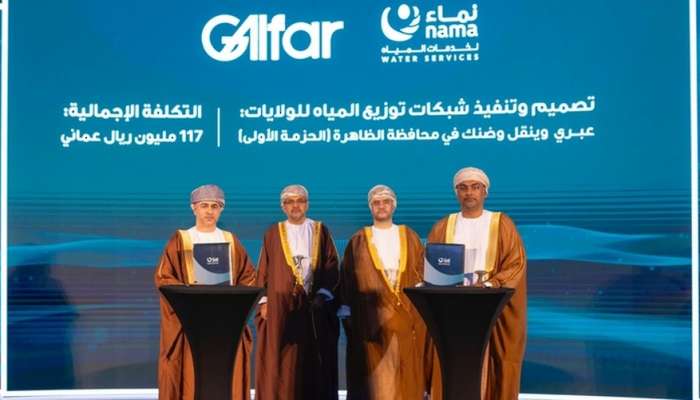
Muscat: Nama Water Services Company signed four agreements to implement strategic projects in the water sector.
The projects included the design and implementation of water distribution networks in the wilayats of Ibri, Yanqul and Dhank in A'Dhahirah Governorate (Packages 1 and 2), the construction of water networks in the wilayats of Samail and Izki in A'Dakhiliyah Governorate and the construction of wastewater networks in Al Ansab in Muscat Governorate.
This was unveiled at a ceremony organised by the company in Muscat on Tuesday under the auspices of Dr. Saud bin Hamoud Al Habsi, Minister of Agriculture, Fisheries and Water Resources.
In a speech at the ceremony, Qais bin Saud Al Zakwani, CEO of Nama Water Services Company, said that the company seeks to achieve sustainability and ensure water security in the Sultanate of Oman by implementing a package of current and future strategic projects across different governorates.
Al Zakwani added that the company is currently implementing 27 projects to the tune of more than OMR700 million to enhance the water and wastewater system in the governorates and wilayats covered by the company’s services—from Musandam to Al Wusta. He said that the projects contribute OMR193 million to the in-country value (ICV).
Al Zakwani pointed out that these projects enhance water networks in the Sultanate of Oman to cover more than 72.80 percent at a time the number of beneficiaries of the company's services grew to 937,970.
Speaking in detail, he said that the projects include a water transmission project connecting the desalination plant in Sohar to A’Dhahirah Governorate, a water system enhancement project connecting the desalination plants in Barka and Sohar, A’Dakhiliyah Governorate’s water transmission enhancement system project and a water transmission system enhancement project between the governorates of South A’Sharqiyah and North A’Sharqiyah.
Al Zakwani explained that the Omanization initiative launched by the company through permanent contracts with companies supporting its work helped generate 885 jobs in the water sector. This, he said, contributed to raising the percentage of Omanization in these companies to 84 percent.